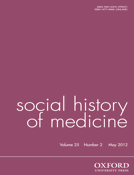-
Views
-
Cite
Cite
Melinda Grimsley-Smith, Revisiting a ‘Demographic Freak’: Irish Asylums and Hidden Hunger, Social History of Medicine, Volume 25, Issue 2, May 2012, Pages 307–323, https://doi.org/10.1093/shm/hkr140
Close - Share Icon Share
Summary
The Irish Famine of the 1840s has been most commonly understood as a social and political event, as the literature has been oriented toward demographic transformation and the drive toward democratisation in the post-Famine period. In this article, I use anomalies in post-Famine admissions to lunatic asylums and contemporary epidemiological research to argue that our understanding of the demographic transformation should incorporate a reckoning of the Famine as a biological event. Sudden and severe nutritional deprivation has measurable significant and long-lasting biological and psychological consequences that in turn have the capacity to alter the trajectory of a society's development. This research has broader implications, as it suggests that effects of chronic food scarcity common to struggling regional and national economies should be taken into account when historians tell the tale of how societies develop.




